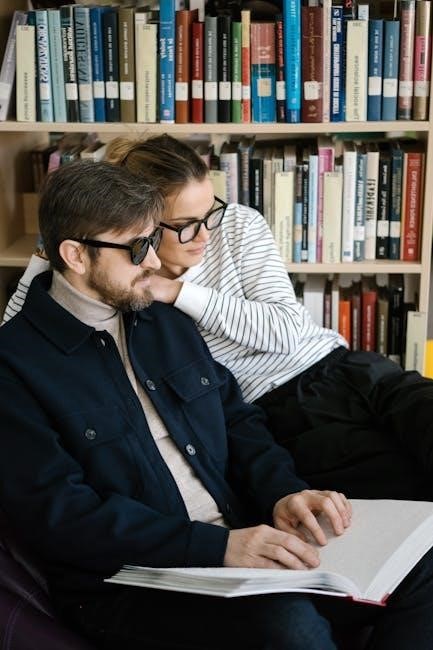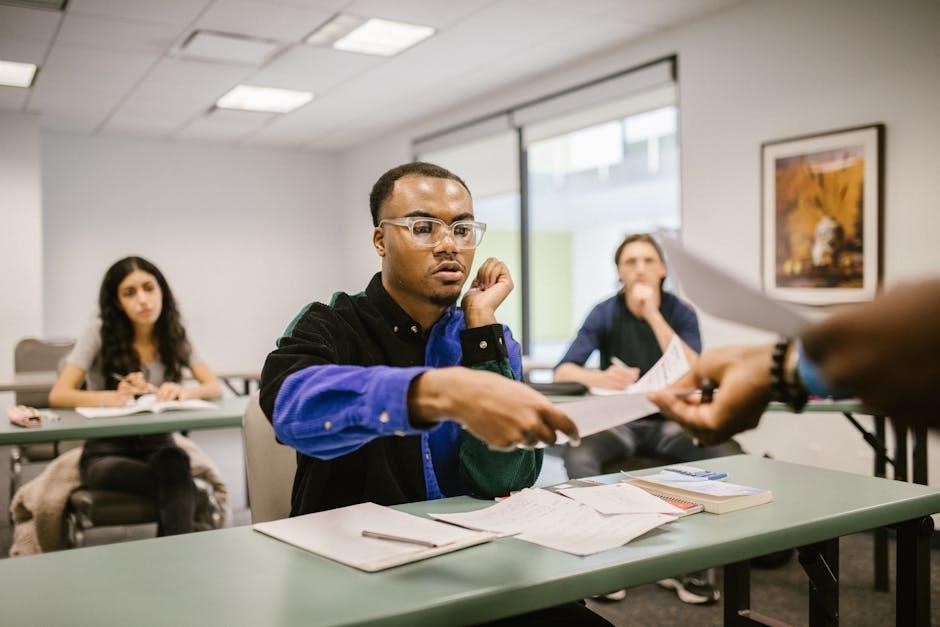The Entered Apprentice Degree is the first step in Freemasonry‚ introducing candidates to the Craft’s principles‚ symbols‚ and moral teachings‚ laying the foundation for further Masonic education and personal growth.
1.1 Overview of the First Degree
The Entered Apprentice Degree is the initial step in Freemasonry‚ marking the beginning of a candidate’s journey. It introduces fundamental principles‚ such as brotherly love‚ moral integrity‚ and self-improvement. The degree emphasizes education‚ personal growth‚ and the pursuit of knowledge. Through symbolic rituals and teachings‚ candidates learn the basics of the Craft‚ preparing them for further Masonic exploration and service to humanity. This degree sets the foundation for understanding Freemasonry’s values and traditions.
1.2 Importance of the Entered Apprentice Degree
The Entered Apprentice Degree is vital as it introduces foundational Masonic principles‚ fostering moral and intellectual growth. It lays the groundwork for understanding Freemasonry’s values‚ such as brotherly love‚ relief‚ and truth. This degree is the cornerstone for all future degrees‚ emphasizing self-improvement and service to others. It marks the beginning of a lifelong journey in Freemasonry‚ preparing candidates to embrace the fraternity’s teachings and contribute meaningfully to their communities.

Initiation Ceremony Overview
The Initiation Ceremony is a symbolic and structured process marking the beginning of a candidate’s Masonic journey‚ emphasizing moral and spiritual growth through ancient rituals and teachings.
2.1 Preparation for the Initiation
Preparation for the Initiation involves diligent study of Masonic principles‚ understanding the significance of the ceremony‚ and seeking guidance from mentors. Candidates are encouraged to reflect on personal values and moral growth. The Lodge provides resources‚ such as study guides‚ to ensure readiness. Emotional and mental preparation are crucial‚ as the ceremony marks a profound commitment to Freemasonry’s teachings and community. Proper attire and punctuality are also emphasized to honor the tradition and respect the fraternity.
2.2 Structure of the Initiation Ceremony
The Initiation Ceremony‚ or First Degree‚ follows a structured sequence‚ beginning with preparation and opening the Lodge. Key elements include symbolic rituals‚ the oath‚ and the introduction to Masonic principles. Officers guide the candidate through the proceedings‚ which emphasize moral lessons and brotherhood. The ceremony concludes with the candidate being welcomed as an Entered Apprentice‚ receiving congratulatory greetings‚ and being instructed in their new role within the fraternity.

Historical Background of the Entered Apprentice Degree
The Entered Apprentice Degree originates from medieval stonemasonry guilds‚ evolving into a modern fraternity focused on moral and intellectual development‚ preserving timeless principles and fostering brotherhood.
3.1 Origins of the First Degree
The Entered Apprentice Degree traces its roots to medieval stonemasonry guilds‚ where apprentices began their journey in the craft. Over time‚ these guilds evolved into speculative Masonry‚ blending practical skills with moral and philosophical teachings. The first degree symbolizes the initiate’s entrance into a fraternity focused on self-improvement‚ brotherly love‚ and moral development. Its rituals and symbols‚ such as the lambskin apron‚ reflect a rich history tied to both craftsmanship and spiritual growth‚ forming the foundation of Masonic education.
3.2 Evolution Over Time
The Entered Apprentice Degree has evolved from medieval stonemasonry guilds to modern speculative Freemasonry. Initially focused on practical skills‚ it transitioned to include moral and philosophical teachings. By the 18th century‚ the degree was formalized with standardized rituals. The incorporation of Enlightenment ideals emphasized reason‚ brotherhood‚ and personal growth. Today‚ it remains the foundational step‚ blending historical traditions with contemporary values to guide new members in their Masonic journey and intellectual development.

Symbolism in the Entered Apprentice Degree
The degree introduces key Masonic symbols like the lambskin apron‚ representing purity‚ and the square and compasses‚ symbolizing virtue and wisdom‚ guiding the candidate’s philosophical journey.
4.1 The Lambskin Apron
The lambskin apron‚ a symbol of purity and innocence‚ is presented to the Entered Apprentice as a reminder of the importance of moral integrity and a clean conscience. It signifies that the candidate should approach Masonry with a pure heart‚ free from malice and deceit. This apron is worn during ceremonies and is a constant reminder of the moral lessons taught in the first degree. Its simplicity reflects the fundamental principles of Freemasonry‚ emphasizing the inward qualities over outward appearances. The apron also symbolizes the candidate’s new journey toward self-improvement and enlightenment‚ representing the protective and purifying nature of virtue. By wearing it‚ the Entered Apprentice is encouraged to maintain their character unblemished‚ just as the lambskin remains unsoiled. This symbol is deeply rooted in Masonic tradition and is one of the most recognizable emblems of the Craft.
4.2 The Square and Compasses
The Square and Compasses are the most recognizable symbols of Freemasonry‚ representing morality and virtue. The Square signifies the importance of fair and honest dealings with others‚ while the Compasses remind us to circumscribe our passions and keep our actions within the bounds of wisdom and justice. Together‚ they symbolize the dual commitment to doing what is right and thinking what is right‚ serving as a constant reminder of the moral lessons taught in the Entered Apprentice Degree.

Masonic Values and Principles
Masonic values emphasize Brotherly Love‚ Relief‚ and Truth‚ fostering harmony‚ compassion‚ and integrity. These principles guide members to lead virtuous lives and contribute to societal well-being.
5.1 Brotherly Love
Brotherly Love is a cornerstone of Freemasonry‚ emphasizing unity and mutual respect among members. It fosters a sense of camaraderie‚ transcending social and cultural boundaries‚ and encourages Masons to treat one another with kindness and compassion. This principle extends beyond the lodge‚ promoting harmony in personal and professional relationships. By embracing Brotherly Love‚ Freemasons create a supportive community dedicated to moral growth and shared values. It is the foundation upon which the fraternity’s teachings are built. Brotherhood is strength‚ and love is its bond.
5.2 Relief
Relief is a fundamental principle of Freemasonry‚ emphasizing the importance of charity and compassion. It teaches Masons to assist those in distress‚ whether within the fraternity or in the broader community. This principle encourages acts of kindness‚ financial support‚ and emotional aid to those in need. By practicing Relief‚ Freemasons uphold the obligation to care for one another and promote a culture of empathy and generosity‚ aligning with the ethical and moral teachings of the Craft.
5.3 Truth
Truth is a cornerstone of Freemasonry‚ representing the pursuit of knowledge‚ integrity‚ and authenticity. It encourages members to seek understanding and live according to moral and ethical standards. Freemasons are reminded to be truthful in their words and actions‚ fostering trust and reliability among brothers. The principle of Truth promotes personal growth and accountability‚ ensuring that Masons uphold the highest standards of honesty and sincerity in their lives and interactions within the fraternity.

Role of the Mentor in Freemasonry
A mentor in Freemasonry guides new members through their Masonic journey‚ offering wisdom‚ support‚ and ensuring a smooth transition into the fraternity‚ fostering growth and understanding.
6.1 Importance of Mentorship
Mentorship is vital in Freemasonry‚ providing guidance and support to new members. A mentor helps navigate the complexities of the Craft‚ fostering understanding and growth. They offer wisdom‚ clarify doubts‚ and encourage active participation. Mentorship ensures a strong foundation for the Entered Apprentice‚ aiding in their Masonic journey and helping them embrace the fraternity’s values. Effective mentors inspire personal development‚ enriching both the individual and the lodge community.
6.2 Responsibilities of a Mentor
A mentor in Freemasonry is tasked with guiding the Entered Apprentice through their initial journey. They provide insightful explanations of Masonic principles‚ symbols‚ and rituals. Mentors assist in studying ceremonial work and preparing for proficiency exams. They encourage active participation in lodge activities and foster meaningful relationships with other brothers. Mentors also offer moral support and ensure the candidate understands the fraternity’s values‚ helping them embody the teachings of Freemasonry in their personal and professional lives.
Preparing for the Initiation Ceremony
Initiation marks the beginning of your Masonic journey. Prepare by understanding the ceremony’s significance‚ focusing on moral growth‚ and embracing the symbolic journey toward enlightenment and brotherhood.
7.1 What to Expect
The initiation ceremony is a transformative experience‚ blending symbolism and tradition. Candidates are prepared spiritually and mentally‚ engaging in rituals that introduce Masonic principles. The ceremony involves symbolic acts‚ such as the opening of the Lodge‚ the candidate’s purification‚ and the revelation of light‚ signifying enlightenment. Emotions may range from anticipation to reflection‚ as the candidate embarks on a journey of self-discovery and brotherhood. The event is both solemn and uplifting‚ marking the official entry into Freemasonry.
7.2 Emotional and Mental Preparation
Emotional and mental preparation is crucial for the initiation ceremony. Candidates should reflect on their values and commitment to Freemasonry’s principles. Studying the guide helps build confidence‚ while an open mind fosters a deeper understanding of the rituals. Engaging with mentors and brethren can provide emotional support‚ ensuring a calm and focused state. This preparation not only enhances the initiation experience but also lays a strong foundation for personal growth and the journey ahead in the Craft.

Life as an Entered Apprentice
Life as an Entered Apprentice involves deepening Masonic knowledge‚ fostering personal growth‚ and engaging in lodge activities‚ guided by mentors to enhance spiritual and moral development.
8.1 Responsibilities of an Entered Apprentice
As an Entered Apprentice‚ responsibilities include attending lodge meetings‚ participating in discussions‚ and studying Masonic principles. Apprentices must prepare for proficiency exams‚ respect confidentiality‚ and embody Masonic values. They are expected to seek knowledge‚ engage with brothers‚ and contribute to lodge activities. Mentorship is key‚ and apprentices should actively learn from their mentors while fostering personal growth and moral development. Fulfilling these duties lays a strong foundation for advancement in Freemasonry.
8.2 Expectations Post-Initiation
Post-initiation‚ Entered Apprentices are expected to deepen their understanding of Freemasonry through dedicated study and active participation in lodge activities. They should engage with brothers‚ build meaningful relationships‚ and prepare for proficiency exams to advance. Apprentices are encouraged to embrace personal growth‚ uphold Masonic values‚ and contribute to the fraternity’s mission. Regular attendance at meetings and involvement in educational programs are essential. This period is a time of learning‚ reflection‚ and integration into the fraternal community.

Structure of a Masonic Lodge
A Masonic Lodge operates with a hierarchical structure‚ led by elected officers who guide members through rituals‚ meetings‚ and community engagements‚ ensuring harmony and adherence to Masonic principles.
9.1 Officers of the Lodge
A Masonic Lodge is governed by elected officers‚ with the Worshipful Master presiding as the highest authority. The Senior and Junior Wardens assist the Master in managing lodge activities. Other key roles include the Secretary‚ who handles administrative tasks‚ and the Treasurer‚ who oversees finances. The Tyler ensures security and order outside the lodge. These officers work together to maintain harmony‚ facilitate rituals‚ and guide members in their Masonic journey‚ ensuring the lodge operates smoothly and in accordance with Masonic principles.
9.2 Lodge Meetings andProtocol
9.2 Lodge Meetings and Protocol
Lodge meetings follow a structured protocol‚ beginning with an opening ritual led by the Worshipful Master. Members adhere to specific etiquette‚ such as addressing officers formally and maintaining decorum. The meeting typically includes discussions on Masonic business‚ educational presentations‚ and ceremonial work. Proper attire‚ often a suit and tie‚ is expected. Silence is observed during rituals‚ and electronic devices are usually prohibited. The protocol ensures respect for traditions and fosters an environment conducive to fellowship and Masonic growth.
The Proficiency Exam
The proficiency exam tests a candidate’s understanding of the Entered Apprentice degree‚ ensuring they grasp its principles and rituals before advancing. It evaluates commitment and knowledge retention‚ requiring thorough study of Masonic teachings and symbolism to demonstrate readiness for the next degree.
10.1 What to Study
Focus on understanding the historical origins of Freemasonry‚ its core symbols like the lambskin apron and square and compasses‚ and the moral lessons embedded in the degree. Study the structure of lodge meetings‚ the roles of officers‚ and the significance of rituals performed during the initiation. Review the obligations and commitments expected of an Entered Apprentice‚ including brotherly love‚ relief‚ and truth. Utilize study guides‚ flashcards‚ and lodge resources to ensure a comprehensive grasp of these principles.
10.2 Tips for Success
Utilize study guides and flashcards to memorize key symbols‚ rituals‚ and moral lessons. Engage with lodge members for insights and clarification. Attend meetings to observe and learn. Practice reciting obligations and catechisms regularly. Stay committed to personal reflection and growth. Seek mentorship from experienced brothers to deepen understanding. Review historical and philosophical contexts to enrich your comprehension. Consistency and dedication are essential for mastering the proficiency exam and embracing the Entered Apprentice responsibilities effectively.

Recommended Study Resources
Essential resources include Freemasonry books‚ online guides‚ and study tools like Quizlet flashcards. Utilize the EA Study Guide and the Masonic Ritual document for comprehensive preparation and understanding of the first degree.
11.1 Books on Freemasonry
Key books for studying Freemasonry include the EA Study Guide‚ which provides a step-by-step learning tool. The Dummies book is highly recommended for its clear and accessible information. Additionally‚ the Masonic Ritual document offers insights into ceremonies and symbolism. These resources are essential for understanding the biblical‚ historical‚ and symbolic foundations of Freemasonry‚ helping candidates prepare for initiation and beyond. They complement online tools like Quizlet flashcards for effective study and retention of Masonic principles.
11.2 Online Resources and Guides
Online resources offer valuable tools for Freemasonry study. Quizlet provides flashcards for key terms and questions‚ aiding memorization. The XOWA program allows offline access to Masonic texts. Websites like r/freemasonry host discussions and guides. Additionally‚ the Masonic Ritual document is available online‚ offering insights into ceremonies and symbolism. These digital resources complement traditional books‚ ensuring comprehensive preparation for the Entered Apprentice degree and beyond‚ while fostering a deeper understanding of Masonic principles and practices.
Practical Advice for New Members
Engage actively in lodge activities‚ seek guidance from mentors‚ and embrace the teachings with an open mind. Respect traditions while fostering brotherly bonds and personal growth through dedication and curiosity.
12.1 Engaging with Lodge Activities
Attend lodge meetings regularly and participate actively in rituals and discussions. Ask questions to deepen your understanding and engage with brethren to foster camaraderie. Volunteer for lodge duties to contribute meaningfully. Respect traditions while embracing opportunities to learn and grow. Building relationships with fellow Masons enriches your journey‚ so be proactive in connecting and participating fully in lodge life and events.
12.2 Building Relationships with Brothers
Building strong relationships with fellow Masons is essential for a fulfilling journey. Engage in open communication‚ show genuine interest‚ and foster mutual respect. Participate in lodge activities and social events to deepen bonds. Seek guidance from experienced brothers while offering support to others. These connections not only enrich your Masonic experience but also provide a network of encouragement and shared growth. Building brotherly ties strengthens the fraternity and enhances personal development.

The Significance of the First Degree
The Entered Apprentice Degree is foundational‚ introducing candidates to Freemasonry’s core principles and values. It sets the stage for moral and intellectual growth‚ preparing members for further Masonic progression and personal development.
13.1 Foundation for Future Degrees
The Entered Apprentice Degree provides essential teachings and principles that serve as the cornerstone for understanding higher degrees in Freemasonry. It introduces fundamental concepts such as brotherly love‚ moral integrity‚ and the pursuit of knowledge. These lessons are expanded upon in subsequent degrees‚ making the first degree crucial for a comprehensive understanding of Masonic philosophy and practice. It ensures a solid base for further spiritual and intellectual growth within the fraternity.
13.2 Personal Growth and Development
The Entered Apprentice Degree marks the beginning of a transformative journey‚ fostering self-awareness‚ moral consciousness‚ and intellectual curiosity. It encourages individuals to seek knowledge with freedom‚ fervency‚ and zeal‚ laying the groundwork for personal growth. By embracing the principles of Freemasonry‚ candidates cultivate virtues such as humility and integrity‚ preparing them for the challenges ahead. This degree inspires self-improvement and a deeper understanding of oneself and society‚ emphasizing that growth is a lifelong journey enriching both personal and fraternal life.
The Entered Apprentice Degree is the cornerstone of Freemasonry‚ offering a profound introduction to its principles and values. It sets the stage for a lifelong journey of moral‚ intellectual‚ and fraternal growth‚ encouraging members to embrace self-improvement and service to others. This guide provides a foundational understanding‚ inspiring continued study and dedication to the Masonic path.
14.1 Summary of the Journey
The journey through the Entered Apprentice Degree is a transformative experience‚ marking the beginning of a Mason’s path to enlightenment. It introduces foundational principles such as brotherly love‚ relief‚ and truth‚ while initiating the candidate into the symbolic and philosophical framework of Freemasonry. This first degree emphasizes personal growth‚ moral development‚ and the pursuit of knowledge‚ establishing a lifelong commitment to the Craft and its values;
14.2 Encouragement for Continued Study
As you progress beyond the Entered Apprentice Degree‚ remember that Freemasonry is a lifelong journey of growth and discovery. Embrace the teachings‚ seek wisdom‚ and actively engage with your lodge and brothers. Mentorship and study resources are available to guide you. Continue to reflect on Masonic principles and their application in your life. The journey ahead promises deeper understanding‚ personal development‚ and meaningful fellowship. Stay committed and eager to learn‚ as the rewards of Freemasonry unfold with each step.